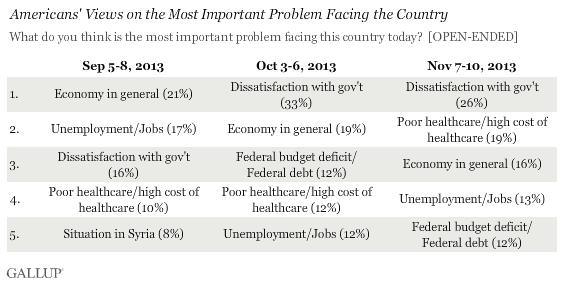This week in America, the concept of “health care consumer” is in a tug-of-war, and those of us trying to behave as such feel bloodied in the skirmish.
One side of the tug-of-war is the obvious, post October 1st reality of the sad state of the Health Insurance Exchanges. This has been well covered in mass media, right, left and center. And Americans polled by Gallup last week express their knowledge of that fact — even if they didn’t know what Healthcare.gov was on the 1st of October.
 The first chart shows that health care is now a front-burner issue for Americans ahead of the economy and jobs. based on Gallup’s poll conducted November 7 through 10, 2013. Health has bubbled as a top problem for people, with nearly double the percent of Americans citing health care and costs are the most important problem facing the nation compared to where the issue fell two months earlier in September 2013 (19% versus 10%).
The first chart shows that health care is now a front-burner issue for Americans ahead of the economy and jobs. based on Gallup’s poll conducted November 7 through 10, 2013. Health has bubbled as a top problem for people, with nearly double the percent of Americans citing health care and costs are the most important problem facing the nation compared to where the issue fell two months earlier in September 2013 (19% versus 10%).
That’s one side of the health consumer arm-wrestle equation. The more optimistic pull on the other end of the rope comes from “Consumers Gaining Ground in Health Care,” one of several columns in this week’s Journal of the American Medical Association (JAMA) titled Critical Issues in US Health Care. The entire November 13, 2013 issue of JAMA is devoted to covering the State of Health Care in America, and includes seminal analyses by some of the top health-thinkers in the nation including but not limited to David Cutler (on the consolidation of hospitals in the country), Donald Berwick (on toxic politics in health care), Zeke Emanuel (on the big hairy audacious goal in health care), Uwe Reinhardt (on the disruptive innovation of transparency), and Noam Levey on the media and health reform.
The Consumers piece is written by James Guest and Lynn Quincy, both of Consumer Reports, that media outlet of consumer-as-king. In full transparency, I’m a long, long-time subscriber to the publication and member of Consumers Union. So were my parents.
 Guest and Quincy are sanguine and hopeful about the role of the Affordable Care Act, to provide price and product transparency in marketplaces, provide coverage for people with pre-existing conditions, and help people become better health care shoppers. This article was written, of course, well before October 1, 2013, when the Health Insurance Exchanges (Marketplaces) switched to “on” and, in a word, failed to launch.
Guest and Quincy are sanguine and hopeful about the role of the Affordable Care Act, to provide price and product transparency in marketplaces, provide coverage for people with pre-existing conditions, and help people become better health care shoppers. This article was written, of course, well before October 1, 2013, when the Health Insurance Exchanges (Marketplaces) switched to “on” and, in a word, failed to launch.
The authors also point out that the private sector of employer-sponsored health care are also working to bolster consumerism in health, through the Choosing Wisely campaign that’s trying to educate people on right-sizing health care in terms of using the right care in the right place at the right time, ultimately avoiding over-treatment.
Health Populi’s Hot Points: The failure of Healthcare.gov for the uninsured, coupled with insured Americans’ losing their promised-they-could-keep health insurance plans, gives people in the U.S. opportunity to truly take on their consumer mantle and say, “Enough.”
What will the results of this Gallup poll mean for people coalescing around health as a national issue?
We’ve seen health care top in polls over the past twenty years as the topic of health reform and health costs have taken center stage. What’s different this time is that some of the vocal voting public, who have paid into health insurance plans for years, have been “fired” by these same companies in the past few weeks.
This cadre of well-meaning and -paying consumers could be the core of a true health consumer movement, the likes of which Guest and Quincy discuss. “There is growing momentum,” they write. “It needs to keep going.”




 Interviewed live on BNN Bloomberg (Canada) on the market for GLP-1 drugs for weight loss and their impact on both the health care system and consumer goods and services -- notably, food, nutrition, retail health, gyms, and other sectors.
Interviewed live on BNN Bloomberg (Canada) on the market for GLP-1 drugs for weight loss and their impact on both the health care system and consumer goods and services -- notably, food, nutrition, retail health, gyms, and other sectors. Thank you, Feedspot, for
Thank you, Feedspot, for  As you may know, I have been splitting work- and living-time between the U.S. and the E.U., most recently living in and working from Brussels. In the month of September 2024, I'll be splitting time between London and other parts of the U.K., and Italy where I'll be working with clients on consumer health, self-care and home care focused on food-as-medicine, digital health, business and scenario planning for the future...
As you may know, I have been splitting work- and living-time between the U.S. and the E.U., most recently living in and working from Brussels. In the month of September 2024, I'll be splitting time between London and other parts of the U.K., and Italy where I'll be working with clients on consumer health, self-care and home care focused on food-as-medicine, digital health, business and scenario planning for the future...